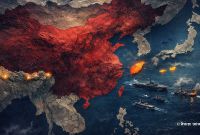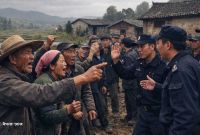Global Outcry Over Forced Labor in Xinjiang Intensifies as Sanctions and Legal Actions Mount

The issue of forced labor in Xinjiang has once again captured global attention as nations impose sanctions and trade restrictions targeting Chinese companies allegedly complicit in human rights abuses. In a significant move, the United States has blacklisted over 100 Chinese firms, barring them from selling goods such as polysilicon, textiles, and tomato paste in the U.S. market. This decision, following the Uyghur Forced Labor Prevention Act (UFLPA), is part of a broader strategy to hold China accountable for what human rights organizations and investigative reports describe as crimes against humanity.
Other Western nations, including Canada, the United Kingdom, and members of the European Union, have implemented similar measures, signaling a coordinated international effort. A recent ruling in the UK’s Court of Appeal, declaring the National Crime Agency's refusal to investigate imports of forced labor goods unlawful, has set a new legal precedent. Businesses can now face prosecution under the Proceeds of Crime Act if they fail to address evidence of forced labor in their supply chains.
The revelations extend beyond textiles, implicating industries like automotive manufacturing. A recent Human Rights Watch report exposed global automakers, including Tesla, Volkswagen, and Toyota, for inadequately mitigating risks linked to forced labor in their supply chains. This has raised questions about multinational corporations' compliance with international human rights standards.
Meanwhile, a 2023-2024 study and earlier reports from organizations like the Australian Strategic Policy Institute have documented the mass internment of Uyghurs and forced labor transfers from Xinjiang, fueling calls for stricter trade bans.
China has denied the allegations, but mounting evidence from U.N. reports, non-governmental organizations, and independent research has intensified international scrutiny. With sanctions, legal challenges, and trade bans disrupting global supply chains, China faces mounting diplomatic and economic isolation.
The growing backlash highlights the international community’s resolve to combat forced labor and human rights abuses, placing China under unprecedented pressure to address these issues and restore global trust.




![From Kathmandu to the World: How Excel Students Are Winning Big [Admission Open]](https://nepalaaja.com/img/70194/medium/excel-college-info-eng-nep-2342.jpg)
